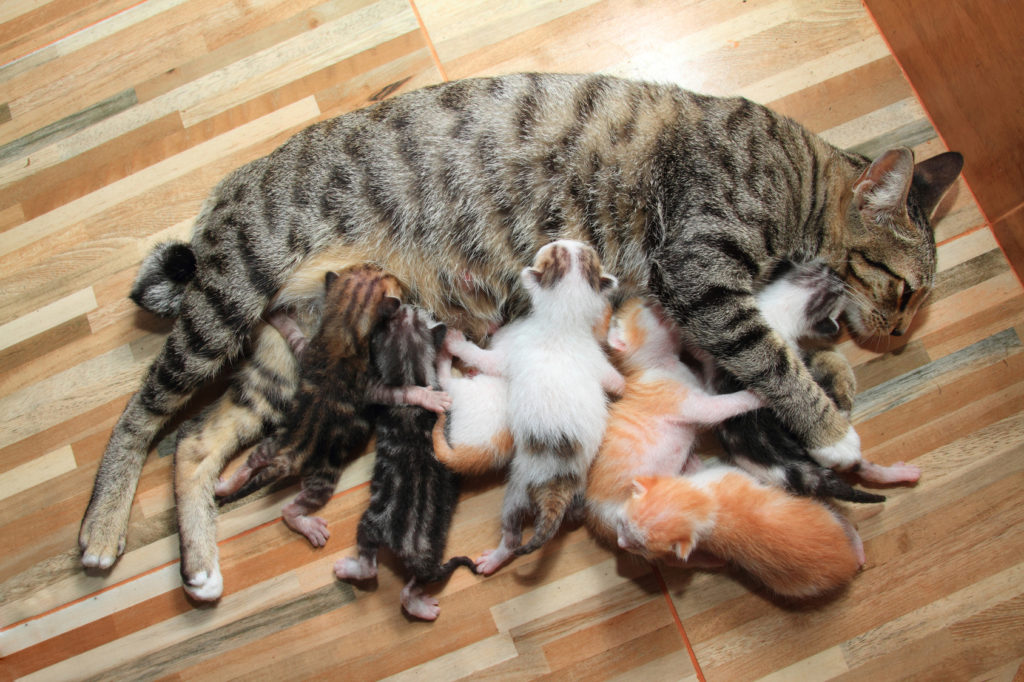Gestation cat
Cats come into heat several times a year and are very fertile. If a cat comes out when she is in heat, there is a good chance she is pregnant. The signs of pregnancy are not obvious, what are the ways to know if a cat is expecting kittens? How can you best monitor pregnancy and provide the pregnant cat with everything she needs?
How to know if a cat is expecting kittens?
When she is expecting kittens, a cat is said to be pregnant. There are no major changes in the first few weeks of gestation, but some signs can be noticed after 3 to 4 weeks.
Good to know: gestation in cats lasts a little over 2 months: 64 to 69 days.
Here are the main signs of pregnancy in cats:
- a complete or only partial stop of the signs of heat
- a change in character (calm, fearful...)
- an increase in weight and abdominal swelling from one month on
- a progressive increase in appetite and drinking
- a late enlargement of the udder (around 7 weeks)
- milk comes in late, around two months
There are not really characteristic symptoms as the woman can have: no morning sickness, no extreme fatigue...
To be sure that a cat is expecting kittens, it is possible to have a pregnancy diagnosis done by your veterinarian:
by ultrasound: we can see the embryos around 18 days, and detect heartbeats and movements around 30 days.
by radiography : after 36 days, when the skeletons of the kittens are ossified. This allows to count the kittens with certainty and to detect possible signs of fetal death. It is better to wait until 40 days to be sure not to miss a kitten not very ossified.
There is no early diagnosis as in women by hormonal measurements.
How to detect the first signs of giving birth? The cat starts to build a "nest" a few days before, she isolates herself from noise and agitation, she purrs a lot. She will certainly lose her appetite and will not eat or will eat very little in the days that precede. The temperature of the cat drops: it easily falls between 37 and 38°C (whereas it is normally of 38.5°C approximately). Following this fall of temperature, the delivery generally takes place under 24 hours.
How to monitor the pregnancy of a cat? How to care for a pregnant cat?
Generally speaking, pregnancy in cats is not very risky and goes smoothly. Monitor her general condition well: she should eat well, not seem down, not show bleeding, etc. Do not hesitate to consult your veterinarian in case of doubt.
Spontaneous abortions (miscarriages) are rare, when they occur they are early and often go unnoticed. The risk of eclampsia (disorders related to a too low level of calcium) during the gestation or after is much less important in the cat than in other species, the dog in particular.
Giving your pregnant cat the right food
It is generally advised to switch to kitten food as of the 2nd month of gestation.
An extra supply of energy and proteins will be beneficial during gestation, and throughout lactation until the kittens are weaned, who will take their cue from their mother to taste the food that will also be adapted to their needs.
We do not ration a pregnant or nursing cat, we consider that she can eat at will during these periods. Make sure she always has a bowl of food available, as well as fresh, clean water.
Handling in-utero kittens
Do not deprive yourself of caressing your pregnant cat, you can very well touch and handle her by taking some precautions: if you have to lift her for example, take her under the hindquarters rather than under the belly.
Kittens are able to feel sensory stimuli in the womb and their psycho-social development would already start in the womb. It is therefore possible to start handling kittens in utero, by stroking the mother's belly during gestation. This allows the kittens to get used to the contact and it is positive for their future socialization.
Vaccinations and parasite treatments
Cats pass on their antibodies to their kittens during lactation, so it is beneficial to have a high level of antibodies. Check with your veterinarian to make sure your cat is up to date on her vaccinations, ideally before pregnancy.
Some vaccines cannot be used during pregnancy, so discuss this with your veterinarian.
It is important to continue deworming and treating a pregnant cat for fleas and ticks. Some antiparasitics are safe to use during pregnancy. Again, ask your veterinarian for advice.
Preparing the nest
In the last days of pregnancy, try to keep your cat indoors as much as possible so she can have her kittens in a safe and comfortable place.
You can provide your cat with a "nest" with a cardboard box lined with cloths or towels, place it in a quiet and peaceful place so that your cat feels comfortable. It is impossible to guarantee that she will agree to give birth in this nest, however... she may choose another place more to her liking, keep a close eye on the comforters, closets, behind furniture, in the nooks and crannies... You can try to move her to her nest if the place you have chosen does not seem to be suitable for her, but you should know that it is possible, even after giving birth, that the cat will try to take her kittens somewhere else in a corner that seems better to her...

